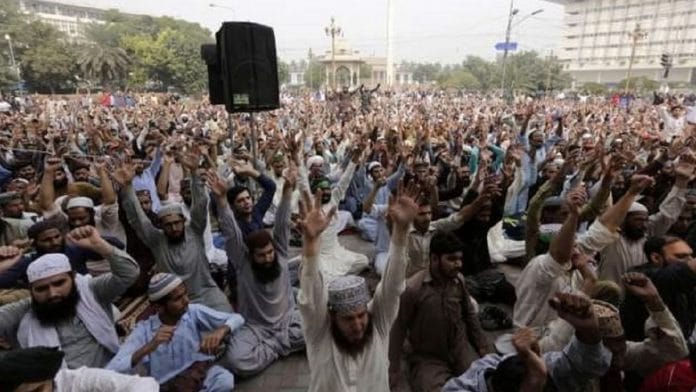New Delhi: Pakistan has banned the far-Right Islamist political party Tehreek-e-Labbaik Pakistan (TLP), days after violent clashes between its supporters and police amid protests over the war in Gaza.
The decision, taken Thursday at a federal cabinet meeting chaired by Prime Minister Shehbaz Sharif, came on the recommendation of the Punjab provincial government under the country’s Anti-Terrorism Act (ATA), according to local reports.
The Prime Minister’s Office said the cabinet “unanimously approved” the move after reviewing evidence of TLP’s involvement in what it described as “violent and terrorist activities”.
“The organisation, established in 2016, has repeatedly incited violence across the country,” the statement read. “Despite earlier assurances, it has continued to carry out acts of terrorism and violent unrest.”
Under Pakistan’s Constitution, the final decision to dissolve a political party rests with the Supreme Court. The government is expected to refer its declaration to the court within 15 days, Dawn reported.
Thursday’s decision marks the second time Islamabad has formally moved to outlaw the group. The TLP, deemed notorious for its hardline rhetoric, sweeping blasphemy allegations, and ability to paralyse cities through street agitation and violence, was previously banned in 2021, only to have the prohibition lifted six months later, following negotiations with the government.
Earlier, Pakistan’s cybercrime authorities detained more than 100 social media activists affiliated with the group for posting inflammatory content online, Punjab Information Minister Azma Bokhari said at a press conference in Lahore.
Also Read: Pakistan general calls India a ‘Trojan horse’, says ‘third-party mediation essential’ on Kashmir
The clashes
The latest episode of confrontation erupted earlier this month, when thousands of TLP supporters launched what they called a “Gaza Solidarity March” from Lahore towards Islamabad, pledging to stage a sit-in outside the US Embassy. Authorities blocked highways and deployed paramilitary forces to prevent the marchers from advancing.
Muridke, a town just north of Lahore, became the flashpoint. Over several days of unrest, at least one police officer and several protesters were killed. The Punjab Police said 48 officers were injured, including 17 by gunfire, and accused demonstrators of using “spiked batons, petrol bombs, and live ammunition”.
“When the state enforces its writ, these masked criminals play the victims,” the Punjab government had said in a statement on X, adding, “The state is not weak.”
TLP leaders countered the allegation, saying that police had opened fire “indiscriminately”, killing at least 11 protesters and leaving dozens wounded. Local media reported that the group’s chief, Hafiz Saad Hussain Rizvi, was critically injured. His whereabouts remain unclear, however. Punjab authorities claim he and his brother fled to Pakistan-occupied Kashmir (PoK), while TLP leaders insist he is in custody.
Later on 17 October, Maryam Nawaz-led Punjab government moved to seek federal authorisation to outlaw the party.
Pattern of violence
Founded in 2016 by cleric Khadim Hussain Rizvi, the TLP rose to prominence by mobilising mass protests in defence of Pakistan’s blasphemy laws. It has since become one of the country’s most disruptive political forces, staging sit-ins that have paralysed Islamabad on multiple occasions, calling for execution of judges, and inciting violence against religious minorities, particularly the Ahmadiyya community.
In recent months, the party has faced growing criticism for orchestrating attacks on Ahmadi mosques and homes in Punjab. Human rights organisations have repeatedly urged the government to curb its activities, describing the TLP as a threat to both religious freedom and state stability.
Despite its extremist reputation, the TLP has carved out a significant political constituency. In Pakistan’s 2024 general elections, it won nearly 2.9 million votes nationwide—the fourth-highest total among all parties—and secured one seat in the Punjab assembly.
At a news conference earlier this week, Punjab Information Minister Bokhari said the provincial government had suspended the licences of 28 weapons dealers and sealed several unlicensed shops as part of a broader crackdown on violent groups.
Authorities also claimed to have seized weapons and ammunition from TLP activists and blocked 75 online links spreading hate material. Bokhari said that more than 500 suspects had been arrested under terrorism laws, while 95 bank accounts linked to Rizvi and his associates were frozen.
She further alleged that police recovered gold, silver and luxury watches from Rizvi’s home, and accused the party of running “no-go zones” in some areas of Punjab. The government has since placed 130 TLP-linked mosques under state control and geo-tagged more than 200 affiliated seminaries. “This is not an action against a sect,” Bokhari said, “but against extremist ideology.”
(Edited by Mannat Chugh)
Also Read: Munir threatens India, again; accuses Delhi of ‘using’ TTP, asks Afghan Taliban to ‘rein in proxies’






